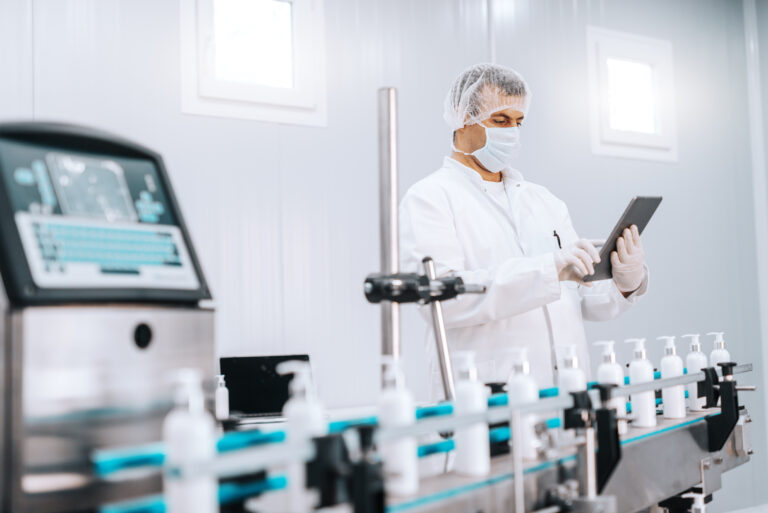Who is allowed to manufacture cosmetics?

Who is allowed to manufacture cosmetics? This is a question that many people ask themselves who experiment with active ingredients and substances at home and would like to bring their own products onto the market. Don’t worry: no one needs a doctorate or a university degree to do this. Nevertheless, various regulations and guidelines must of course be observed, and these are quite strict. Otherwise, anyone could produce and bottle their own formulations as they pleased, between the refrigerator, stove and kitchen table, and bring them onto the market. The consequences would be unimaginable: a lack of hygiene, incorrect or even harmful ingredients, and questionable recipes could cause illness and, in the worst case, even be life-threatening. The question ‘Who is allowed to manufacture cosmetics?’ can therefore be answered as follows: anyone who adheres to the regulations and guidelines and undergoes regular audits.
Who is allowed to manufacture cosmetics: the most important points at a glance
The following principles should be observed when considering the question ‘Who is allowed to manufacture cosmetics?’
- The European Cosmetics Regulation must be complied with.
- The Cosmetics GMP must be complied with.
- Optimal conditions for safe and hygienic storage must be available.
- Interested parties should contact the relevant monitoring office at an early stage.
Who is allowed to manufacture cosmetics: what is GMP?
GMP is the abbreviation for Good Manufacturing Practice. This term refers to guidelines that serve to ensure the quality of production processes in the manufacture of pharmaceuticals, food and animal feed, as well as cosmetics. These guidelines also take into account the production environment. Adherence to GMP guidelines helps to ensure product quality and ensures that the requirements of health authorities have been met. Quality assurance is of the utmost importance in the pharmaceutical and cosmetics industries. Even the smallest deviations or deficits could ultimately have a direct and massive impact on the health of consumers.
What elements does GMP include?
In connection with good manufacturing practice, we speak of a GMP-compliant quality assurance system. This in turn includes various elements that must be adhered to without fail.
Who is allowed to manufacture cosmetics: the regulations
First and foremost is document management, which refers to specification documents such as forms and work instructions, as well as to records. It must be ensured that computer systems have a so-called audit trail, which records digital work processes precisely and in a tamper-proof manner. This also includes any changes.
The second element of GMP, deviation management, also plays an important role in the question of who is allowed to manufacture cosmetics. For example, unplanned deviations from specifications or GMP principles must be documented and evaluated. Change management, on the other hand, involves, among other things, having planned changes approved by quality assurance before they are implemented. The subsequent implementation must then, of course, also be documented.
Another building block of good manufacturing practice is the qualification of equipment. Is the equipment suitable for the purpose? Does it work properly and reliably? However, this does not mean that a professional laboratory is needed if you are wondering ‘Who is allowed to manufacture cosmetics?’ A metal work surface that can be cleaned hygienically could be sufficient, for example. In addition, raw materials and finished products should be stored separately. Other factors include risk management and internal audits.
Scope of GMP
Regarding the question of who is allowed to manufacture cosmetics, it should be noted that GMP applies to all production steps and areas, starting with the personnel and extending to industrial hygiene and the testing of the end products. Compliance with the regulations is not optional, and a manufacturer cannot choose to comply with them for marketing reasons. Rather, GMP is legally anchored in the Cosmetics Regulation and may not be circumvented. Anyone who manufactures their products according to this standard fulfils the requirements of DIN EN ISO 22716.
However, a sufficient understanding of the standard is required for daily work and for dealing with GMP. So anyone wondering ‘Who is allowed to manufacture cosmetics?’ should know exactly how the implementation has to be carried out.
Who is allowed to manufacture cosmetics: the IFS standard
The IFS standard was designed for manufacturers of body care products and is used to assess both the quality and the safety of various processes and cosmetic products. A corresponding certification creates transparency and increases consumer trust. In this way, the manufacturer reduces risks and, with the certificate, has a convincing argument for placement in retail outlets. The IFS standard is recognised by retailers all over the world.
Adherence to the regulations has the highest priority
The manufacture of cosmetics is not tied to any special qualification, but the provisions of the Cosmetics Regulation and the GMP must be adhered to. In addition, manufacturers must undergo regular audits.
It is also possible to manufacture according to the well-known seals for natural cosmetics, although this is usually more expensive. If you are thinking of manufacturing cosmetic products, you should also be very flexible and able to fill a wide variety of packaging. The answer to the question ‘Who is allowed to manufacture cosmetics?’ thus depends on various factors. Cosmacon will be happy to advise you on the manufacture of cosmetics.